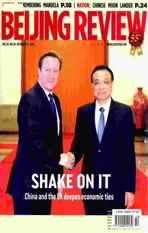Integrating Realty Registration
2013-04-29ByLanXinzhen
By Lan Xinzhen

‘This is a good policy. If it can be im- plemented this year, housing prices will drop immediately.” This Weibo post on the evening of November 20 by Pan Shiyi, CEO of SOHO China, a leading Chinese real estate company, quickly went viral on the Internet and was also cited by media reports. Among the 16 million followers of Pan, many are from the media.
The policy mentioned by Pan is the “unified realty registration system.” An executive meeting of the State Council chaired by Premier Li Keqiang on November 20 decided to integrate the responsibilities of realty registration into one department and establish a single informationsharing platform.
The effect of the policy seems to have been felt sooner than Pan had expected. Although the detailed measures are yet to be formulated, the pace of the price rise in the real estate sector has begun to slow down. According to a weekly market review released by Everbright Securities Co. Ltd. on November 24, the unified realty registration system has affected market sentiment, and the growth of new home prices has moderated slightly.
However, Zhu Zhongyi, Vice President of the China Real Estate Industry Association, thinks the unified realty registration system will not really lead to a drop in housing prices. In his opinion, the new policy can set up a single information-sharing platform, but cannot curb speculation and price hikes. The goal of integrating the nationwide realty information is to offer a reference for the government to get data and formulate policies. It will serve as a tool to moni- tor market changes, so it will be more effective in anti-corruption than in curbing prices. Whether it is to curb housing prices or fight against corruption, these arguments indicate that the unified realty registration system has had some effect.
Unified registration
In China, the term “realty” refers to both natural resources such as land, buildings, trees and forests. Currently the registrations of arable land, forests, beaches, islands and houses are administered by separate departments of land, agriculture, forestry and construction, with each having different registration procedures and standards.
Zhu says there are various reasons behind such a diversified scattered registration system. With the economic and social development, especially the increasing demands of the market economy for a clear property rights system, the existing registration system has showed deficiencies and cannot meet the demands of the current stage of development.
The Chinese Government decided to integrate previously scattered registration responsibilities into the Ministry of Land and Resources, which will supervise the realty registration nationwide and establish a “basic platform” on which realty approval, transactions and registration information can be shared by different agencies. Meanwhile, the establishment of a realty information inquiry system has also been proposed.
According to Zhu, the recently held Third Plenary Session of the 18th Central Committee of the Communist Party of China decided to give the market forces full play in resource allocation. A basic precondition for the operation of the market economy is clear property rights. Realty not only represents the wealth of the people, but also serves as the most important commodity in a market economy. Only clear ownership rights can protect the legitimate interests of realty holders and ensure efficiency and safety of the market transactions, hence facilitating future reforms.
Since realty registration responsibilities and management are scattered among different departments, the related information has become the exclusive resource of each respective departments. Individuals and enterprises have to go through procedures in different departments when handling credit mortgage and realty transactions. Moreover, if other departments want to obtain related information, they also have to use various channels. If departments do not cooperate with each other, there can be many disagreements.
Therefore, integrating the realty registration responsibilities is an important part of transforming government functions and a necessary requirement in improving the market economy and establishing a modern market system. By providing “one-stop” services, the government can simplify procedures and reduce the burden on individuals and enterprises.
Housing regulation
Among different items of realty, housing attracts the most attention. Therefore, the unified realty registration system has aroused discussions on housing market control, information transparency and social fairness.
Zhu says although the realty registration system itself is not a measure of housing market control, it has the biggest impact on the housing market.
Soaring housing prices and corruption cases involving housing in recent years have led to widespread public discontent. Some people hold that the unified realty registration system will expose hidden housing-related corruption, and will make an immediate impact on promoting social fairness and combating abuse.
A single information-sharing platform will also curb the incentive to invest in the housing sector. Particularly, those with high off-thebooks income may no longer choose housing as an investment channel.
The Everbright report points out that the integration of the realty registration responsibilities may be the first step in establishing a longlasting housing market control mechanism. “We believe a unified realty registration system will help clarify farmers right to housing and land, boost realty transactions between urban and rural areas and provide basic information for housing market control and property tax,” said the report.
Thorny problems
When promulgating the Real Right Law in 2007, China vowed to integrate the realty registration system. Six years have passed and the system has not yet been established. Han Changji, a researcher on real estate industry with CIConsulting, a Shenzhen-based consulting firm, said the main reason is that registration responsibilities are scattered, making registration a complicated procedure with high costs. Different places have different technology, platforms and staff quality. Since it involves too many interests, some localities and departments may be reluctant to cooperate.
“The biggest difficulty in establishing a unified registration system is that it involves personal property or privacy, therefore some people may be unwilling to cooperate. This is because Chinese are traditionally reluctant to reveal their property and the public may be concerned about the risks of leaking personal property information,” Han said. According to him, unified registration will touch on the interests of some people who dont like to disclose such properties. Lack of cooperation by some localities, difficulties in the disclosure of personal information of government officials and cumbersome basic data reorganization will present challenges to the implementation of the unified realty registration system.
Han said the new leadership has taken several steps to transform government functions. By streamlining administration, delegating power to lower levels and innovating administrative management methods, it has showed its resolve to reduce corporate burdens and increase market vigor. The related departments now need to make efforts to ensure orderly and stable progress in integrating realty registration.
Tan Jun, an official from the China Land Science Society, said the major difficulty in implementing unified land registration is integrating the registration of land and housing, because it requires a reorganization of the functions of land and housing departments. It will also take one or two years to unify the classification standards of land and information networks in different places.
Tan believed besides reorganizing government functions, integration of realty registration also requires related departments to deliver their registration information to the department of land and resources and help ensure the information is authentic, complete and reliable. But the process itself cannot be finished in a short time. Without a lot of time investments and efforts, the unified realty registration may not yield satisfactory results.
